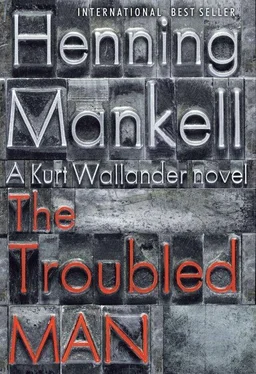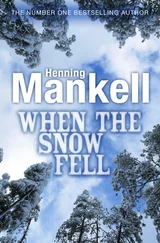“I think a few minutes will be enough. It’s an extremely thin report. Which means that most of it isn’t considered suitable for me or other ordinary police officers to see. ‘Parts of the report are classified as secret,’ it says. Which no doubt means that nearly all of it is classified. They’ve tossed us a few grains of sand. If there are any pearls, they’re keeping them for themselves.”
Ytterberg was suddenly struck by a fit of sneezing.
“Sorry,” he said. “I’m allergic. They use some kind of cleaning substance in the police station that I can’t tolerate. I think I’ll start scrubbing my office myself.”
“That sounds like a good idea,” said Wallander impatiently.
“I’ll read you a section of the report: ‘The material, including microfilm and photographic negatives, and some encrypted text, found in Louise von Enke’s purse contains military material classified as secret. Most of it is particularly sensitive, and was classified as secret precisely so as to avoid it coming into the wrong hands.’ End of quote. In other words, there’s no doubt about it.”
“That the material is genuine, you mean?”
“Exactly. And it also says in the report that similar material has come into Russian hands in the past, as they have used Swedish elimination processes to establish that the Russians are in possession of knowledge they should not have had access to. Do you understand what they mean? Much of the report is written in opaque military jargon.”
“That’s the way our own secret colleagues tend to write — why should the military types be any different? But I think I understand.”
“It’s not possible to avoid the conclusion that Louise von Enke had been sticking her fingers into the military honeypot. She sold intelligence material. God only knows how she came by it.”
“There are still a lot of unanswered questions,” Wallander said. “What happened out there at Värmdö? Why was she murdered? Who was she supposed to meet? Why didn’t that person or those persons take the set of documents she had in her purse?”
“Perhaps they didn’t know it was there?”
“Maybe she didn’t actually have it with her,” said Wallander.
“We’re looking into that possibility. That it might have been planted.”
“As far as I can see, that’s not impossible.”
“But why?”
“To make sure she’d be suspected of spying.”
“But she is a spy, isn’t she?”
“It feels like we’re in a labyrinth,” said Wallander. “I can’t find my way out. But let me think about what you’ve told me. How high a priority are you giving this murder just now?”
“Very high. The rumor is that it will feature in some television show about current criminal investigations. The bosses are always nervous when the media turn up with microphones.”
“Send them to me,” said Wallander. “I’m not afraid.”
“Who’s afraid? I’m just worried I’ll turn nasty if they ask me silly questions.”
Wallander sat down on the bench again and thought about what Ytterberg had said. He tried to find things that didn’t add up, without succeeding. He was finding it hard to concentrate.
Mona’s eyes seemed glazed over when she and Linda returned. Wallander realized that she’d been crying. He didn’t want to know what they had been talking about, but he did feel sorry for Mona. He would like to ask her his question as well: How did your life turn out? She was standing in front of him, gray and dejected, shaking, oppressed by forces stronger than she was.
“It’s time for my treatment,” she said. “Thank you for coming. What I’m going through isn’t easy.”
“What does your treatment entail?” Wallander asked in a brave attempt to appear interested.
“Right now I’m meeting with a doctor. His name is Torsten Rosén. He’s had alcohol problems himself. I have to hurry or I’ll be late.”
They said their good-byes in the courtyard. Linda and Wallander drove home in silence. He thought she was no doubt more troubled than he was. Her relationship with her mother had grown stronger once the stormy teenage years were past.
“I’m glad you came with me,” Linda said when she dropped him off.
“You didn’t give me much choice,” he said. “But of course, it was important for me to see how she’s doing, what she’s going through. The question is, will she get better?”
“I don’t know. I can only hope so.”
“Yes,” said Wallander. “There’s only one possibility left: to hope.”
He thrust his hand in through the open window and stroked her hair. She turned the car around and drove off. Wallander watched the car disappearing.
He felt heavyhearted. He let Jussi out of his kennel and tickled him behind his ears before unlocking the front door. He noticed right away that somebody had been in the house. One of the traps he had set had produced a result. On the windowsill next to the front door he had placed a candlestick directly in front of the window’s handle. Now it was standing closer to the pane, to the left of the handle. He paused and held his breath. Could he be mistaken? No, he was quite sure. When he examined the window more closely, he saw that it had been opened from the outside with a narrow, sharp instrument, probably something similar to the tool used by car thieves to open door locks.
He lifted up the candlestick and examined it carefully: it was made of wood, with a copper ring where the candle was inserted. He put it down again just as carefully, then worked his way slowly through the house. He found no other traces of a break-in. They are careful, he thought. Careful and skillful. The candlestick was an uncharacteristic slip.
He sat down at the kitchen table, contemplating the candlestick. There was only one explanation for unknown people breaking into his house.
Somebody was convinced that he knew something he didn’t know he knew. Something based on his notes, or even some object in his possession.
He sat motionless on his chair. I’m getting closer, he thought. Or somebody is getting closer to me.
The next morning he was hustled out of his sleep by dreams that he couldn’t remember. The candlestick on the windowsill reminded him that somebody had been close to where he was now. He went out into the garden naked, first to pee, and then to let Jussi out of his kennel. An early fall mist was drifting in over the fields. He shuddered and hurried back indoors. He dressed, made coffee, then sat down at the kitchen table, determined yet again to try to clarify what had happened to Louise von Enke. He knew that he wouldn’t be able to establish anything but a highly provisional explanation. But he needed to go through everything once more, very carefully, mainly in the hope of finding a reason for the nagging feeling that there was something he’d overlooked. The feeling was even stronger now that, yet again, somebody had been rummaging around in his house. In brief, he had no intention of washing his hands of it all.
But he found it hard to concentrate. After a few hours he gave up, gathered his papers, and went to the police station. Once again he chose to enter via the basement garage, and he came to his office without bumping into anybody. After half an hour spent hunched over his papers, he checked that the hallway was empty and went to the coffee machine. He had just filled his mug when Lennart Mattson appeared. Wallander hadn’t seen his boss for a while, and he hadn’t missed him. Mattson was tanned and had lost weight, something that immediately made Wallander jealous and annoyed.
“Here already?” Mattson asked. “Can’t keep away, huh? Can’t wait to get back to work? That’s how it should be, you can’t be a good police officer if you’re not passionate about your work. But I thought you weren’t due back until Monday.”
Читать дальше












